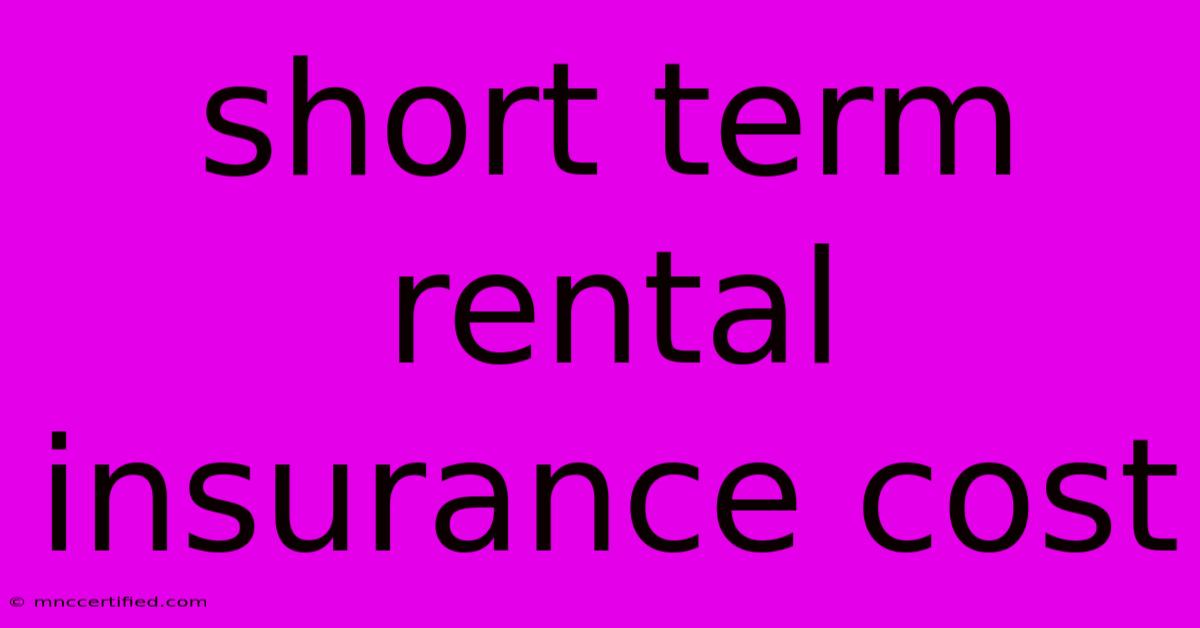Short Term Rental Insurance Cost

Table of Contents
Short-Term Rental Insurance Cost: A Comprehensive Guide
Are you considering adding a short-term rental to your investment portfolio or already managing one? Understanding the cost of short-term rental insurance is crucial for protecting your asset and your financial well-being. This comprehensive guide will delve into the factors influencing the price of this specialized insurance, helping you budget effectively and make informed decisions.
What Factors Determine Short-Term Rental Insurance Costs?
Several key factors influence how much you'll pay for short-term rental insurance. These aren't fixed numbers; they interact to create a unique price for your specific situation.
1. Location, Location, Location: The Impact of Geography
Your property's location is a primary driver of insurance costs. High-risk areas prone to natural disasters (hurricanes, wildfires, earthquakes) or high crime rates will command significantly higher premiums. Urban areas, generally, tend to be more expensive to insure than rural ones. Consider this: a beachfront property in Florida will likely be much more expensive to insure than a similar-sized property in a less disaster-prone state.
2. Property Value and Features: Size Matters (and Amenities Too!)
The value of your rental property directly impacts your insurance costs. A larger, more luxurious property with high-end amenities will naturally be more expensive to insure than a smaller, more basic unit. The replacement cost of the structure and its contents is a key factor considered by insurers. Think about: a fully furnished, modern condo will cost more to insure than a sparsely furnished apartment.
3. Liability Coverage: Protecting Yourself From Lawsuits
Liability coverage protects you from financial losses stemming from accidents or injuries on your property. Higher liability limits mean higher premiums. Consider the potential risks associated with your rental property, such as swimming pools, balconies, or stairs, which could increase your liability risk and therefore your insurance costs. Remember: a policy with $1 million in liability coverage will cost more than one with $300,000.
4. Deductible Selection: Balancing Premium and Out-of-Pocket Costs
Choosing a higher deductible will lower your premium. However, this means you'll pay more out-of-pocket if you make a claim. Carefully weigh the balance between premium savings and potential out-of-pocket expenses when selecting your deductible. Strategy: a higher deductible can be a cost-effective option if you're comfortable with a larger initial expense in case of damage.
5. Insurance Provider and Policy Type: Comparing Apples to Apples
Different insurance providers offer varying rates and policy types. Shop around and compare quotes from multiple providers to find the best value for your needs. Specialized short-term rental insurance policies are typically more comprehensive and may be more expensive than standard homeowner's or landlord insurance, but offer better protection for your specific needs. Action: obtain at least three quotes from different insurers before committing.
6. Occupancy Policy: How Often Your Property is Rented
Some insurers offer different rates based on the frequency of your property's occupancy. Properties rented out for longer periods might attract lower premiums compared to those rented frequently on a short-term basis, often through platforms like Airbnb or Vrbo.
How to Find Affordable Short-Term Rental Insurance
- Shop Around: Get quotes from several insurers specializing in short-term rentals.
- Bundle Policies: See if your current insurer offers discounts for bundling policies (home, auto, etc.).
- Increase Your Deductible: A higher deductible typically lowers premiums.
- Improve Property Security: Enhance security features to reduce risk and potentially lower premiums.
- Consider Loss Control Measures: Implement measures to mitigate potential risks, like routine maintenance and safety checks.
Conclusion: Protecting Your Investment Wisely
Short-term rental insurance is a necessary expense to safeguard your investment and protect yourself from potential liabilities. While the cost can vary significantly depending on various factors, understanding these factors empowers you to make informed decisions and secure the most appropriate and cost-effective insurance coverage. Remember to carefully compare quotes and select a policy that adequately protects your property and your financial interests. Don't hesitate to consult with an insurance professional for personalized guidance.

Thank you for visiting our website wich cover about Short Term Rental Insurance Cost. We hope the information provided has been useful to you. Feel free to contact us if you have any questions or need further assistance. See you next time and dont miss to bookmark.
Featured Posts
-
Leicester Vs Chelsea Premier League Streaming
Nov 23, 2024
-
Premier League Live Leicester Vs Chelsea Stream
Nov 23, 2024
-
Great Football Game Honest Opinion
Nov 23, 2024
-
Cardiovascular Work Cynthia Erivo
Nov 23, 2024
-
Putnam Short Duration Bond Fund
Nov 23, 2024